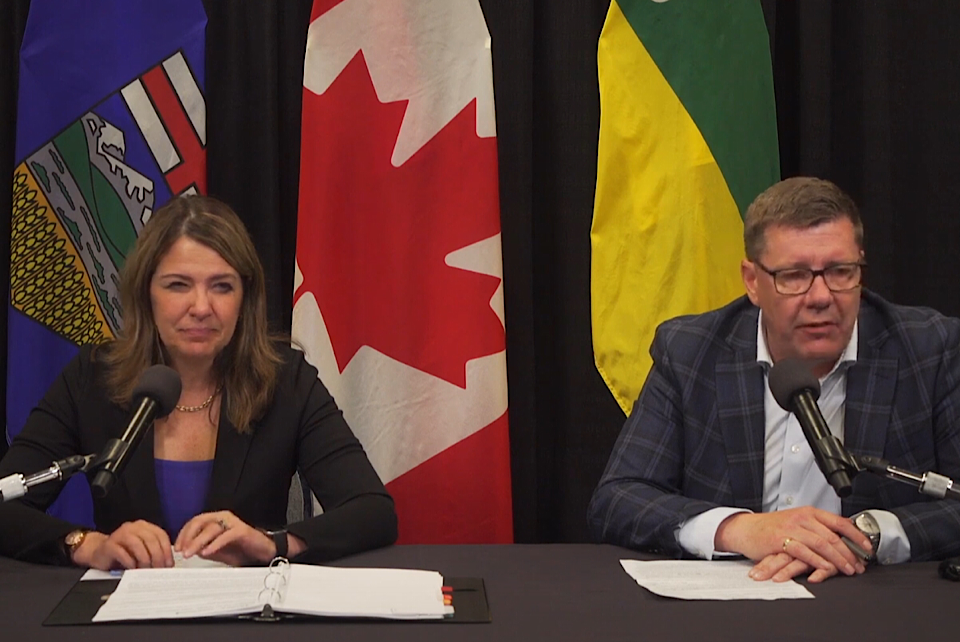LLOYDMINSTER — How to get major projects built and get resources out to the world markets turned out to be the major topic in meetings of Saskatchewan Premier Scott Moe and Alberta Premier Danielle Smith in Lloydminster.
What emerged from a joint caucus meeting of their two governments was a statement in which they called for an end to all federal interference in the development of provincial resources, including eliminating the oil and gas emissions cap, scrapping the Clean Electricity regulations, and lifting the tanker ban among others.
“I think we're here today as a united caucus because we've decided that enough is enough,” Smith said at a closing news conference Wednesday.
“Development of provincial resources is provincial responsibility and that includes the development of our transmission and electricity grids and if we can unite in a common purpose we can ensure that the rest of Canada hears our voices that Ottawa should stop interfering because Saskatchewan have an opportunity to speak with one voice to Ottawa outlining a vision for our country and we can call for a country that works for all of us.”
“I would just reiterate all that Premier Smith has said,” said Moe, who expressed a hope they could work alongside the federal government in “really correcting some of the regulatory space that we we have in this nation when it comes to the development of our of our natural resources and ultimately getting those resources to the world.”
Moe also pointed to the opportunity for “a port-to-port corridor that I believe should be of the highest priority in the nation of Canada.”
He saw it as a “generational strategic project that would provide the opportunity to create wealth not just in western Canada but for all Canadians for literally decades if not centuries into the into the future.” He said it has to be for all products, whether it is hydroelectricity, expanding rail access, but also “access for the oil and gas industry so that we can expand one of the most sustainable oil and gas industries in the world.”
Moe said that even if that pipeline did not ship Saskatchewan barrels of oil, there would still be direct benefit because the price differential would shrink, and “Saskatchewan is going to receive a higher price per barrel of oil on every barrel of oil that we ship.” It would also free up rail capacity for other products like agri-food, and open additional egress capacity into the United States.
In speaking to reporters, the Premiers made known they did not want to see a repeat of what they had seen in the past. Premier Smith made clear she wanted the barriers that discouraged private sector investment to be removed.
“I look at the Trans Mountain pipeline. If we have to build another pipeline with federal taxpayer dollars that would be a failure of the process,” said Smith.
She said the barriers “probably added billions of dollars of additional cost” to that project, which was “why I welcome the two years ‘yes’ window where we can streamline the permitting process, figure out the right way to do it. Because if we had the private sector building, we would have had Keystone XL, we would have had Energy East, we would have had Northern Gateway and Alberta would already be well on its way to doubling its production.”
Moe pointed to Prime Minister Carney’s “aspirational comments around making policy decisions that would ensure that Canada can become an energy superpower and have the strongest economy in the G7.”
“If we want to truly aspire to those two statements, and I think we can, then policies certainly do matter and the policies are much larger than any single pipeline that might have to be built.”
Moe pointed to Western premiers coming forward with “the port-to-port corridor concept which I think is generational in what it can achieve for all Canadians, in particular those in the western four provinces and the northern territories. That port-to-port corridor would really provide the opportunity for us to open up markets in Asia, open up additional capacity in Europe for all products that we produce.”
As for the federal Bill C-5, the bill where cabinet could approve projects deemed in the national interest, the Premiers weighed in on where they stood on it.
“I would say bill C-5 is a necessary condition to jumpstart the investment in our country but it's not going to be sufficient to change the investment climate overall in the long run,” Smith said.
Smith said she thought it was going to be “necessary to do something of dramatic fashion after everything that has been done over the last 10 years to chase investment away and depressed investment." But Smith reiterated that it would “be an utter failure” if every project that had to be built in Canada had to be built with federal tax dollars because no private proponent is willing to come forward.
Moe added many of the things that needed to be changed in the regulatory environment were not in Bill C-5. What Bill C-5 does, he said, is “essentially legislating through the current regulatory environment that makes it virtually impossible for large scale nation building projects to move ahead.”
He said that by the introduction and ultimately passing of Bill C-5, “there is an admission that the regulatory process has to change.”
Moe said that work has to happen, and ultimately show some “significant signs in the way of legislation being repealed and introduced in the federal Parliament” this fall. “We need to fix the regulatory environment.”




